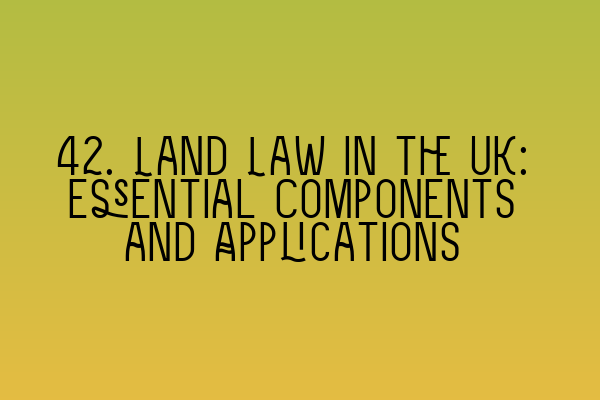42. Land Law in the UK: Essential Components and Applications
Welcome to the SQE Property Law & Land Law blog! In this article, we will explore the essential components and applications of Land Law in the UK. Land Law is a fundamental area of study for aspiring solicitors and plays a crucial role in many legal processes involving property.
If you are preparing for the SQE 1 or SQE 2 exams, be sure to check out our related articles:
- SQE 1 Practice Exam Questions
- SQE 1 Practice Mocks FLK1 FLK2
- SQE 2 Preparation Courses
- SQE 1 Preparation Courses
- SRA SQE Exam Dates
What is Land Law?
Land Law refers to the set of rules that govern the ownership, use, and transfer of land and property in the UK. It encompasses a wide range of legal principles and regulations that help maintain order and ensure the proper functioning of property transactions.
Essential Components of Land Law
Understanding the essential components of Land Law is crucial for any solicitor practicing property law. These components include:
- Freehold and Leasehold: Freehold and leasehold are the two main types of property ownership in the UK. Freehold refers to full ownership of a property and the land it sits on, while leasehold relates to ownership of the property for a fixed period under a lease agreement.
- Registered and Unregistered Land: Land can be either registered or unregistered. Registered land is officially recorded in the Land Registry, providing a transparent system for property ownership. Unregistered land, on the other hand, lacks official documentation and requires additional legal processes for ownership verification.
- Easements: Easements are rights that allow individuals to use another person’s land for a specific purpose, such as accessing a neighboring property or using a shared driveway. Understanding the rules and limitations of easements is essential for resolving boundary disputes and ensuring the proper use of land.
- Covenants: Covenants are legal obligations or restrictions that apply to certain properties. They can be positive, imposing an obligation to do something, or negative, prohibiting certain actions. Covenants play a vital role in property transactions and can affect the use and enjoyment of land.
- Mortgages: Mortgages are loans secured against property. H
aving a thorough understanding of mortgage law is essential for solicitors involved in property financing, as it governs the rights and responsibilities of both borrowers and lenders.
Applications of Land Law
Land Law has widespread applications and plays a crucial role in various legal processes. Some common applications include:
- Buying and Selling Property: Land Law regulates property transactions, ensuring that the transfer of ownership is legal and properly documented. This includes the drafting and review of contracts, conducting property searches, and facilitating the transfer of funds.
- Tenancy Agreements: Understanding Land Law is essential for drafting tenancy agreements, whether for residential or commercial properties. Landlords and tenants must adhere to legal requirements and rights to ensure a fair and transparent tenancy relationship.
- Land Disputes: Land Law plays a significant role in resolving boundary disputes, disagreements over easements, breaches of covenants, and other conflicts related to land. Solicitors specialized in Land Law help clients navigate through dispute resolution processes, including negotiation, mediation, and if necessary, litigation.
- Land Development: Land Law provides the legal framework for land development projects. Solicitors assist clients in obtaining planning permission, navigating zoning regulations, and ensuring compliance with environmental and building regulations.
These are just a few examples of the numerous applications of Land Law in the UK. Aspiring solicitors must develop a comprehensive understanding of Land Law to provide effective legal advice and representation to their clients.
Conclusion
Land Law in the UK is a complex and extensive area of study. It encompasses various essential components, including freehold and leasehold, registered and unregistered land, easements, covenants, and mortgages. Understanding Land Law is crucial for solicitors practicing property law, as it underpins many legal processes involving land and property. From buying and selling property to resolving land disputes and facilitating land development projects, Land Law has countless applications.
Once again, if you are preparing for the SQE 1 or SQE 2 exams, be sure to explore our related articles for valuable exam preparation resources:
- SQE 1 Practice Exam Questions
- SQE 1 Practice Mocks FLK1 FLK2
- SQE 2 Preparation Courses
- SQE 1 Preparation Courses
- SRA SQE Exam Dates
Thank you for reading! If you have any questions or need legal assistance regarding Land Law or any other property-related matters, don’t hesitate to contact SQE Property Law & Land Law. Our expert solicitors are here to help!
